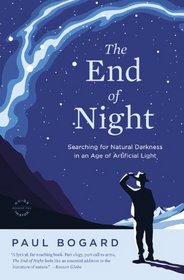"Tomorrow I will head to Guernsey, a bobbing diesel-churned journey, and find cobrahead fixtures, unshielded lights, the insistent roar of the motors that rule our lives. But tonight in a field on Sark, I lie staring up - and around - at the starry sky, a man on his back in a field, all but disappeared." The bibliographical references for this book are: Light pollution; Night - Psychological aspects; Lighting - Physiological aspects; and Lighting - Social aspects. Like Bryce Canyon National Park Ranger Kevin Poe observes towards the end of this book, I am one of those people that had never heard the words "light" and "pollution" in the same sentence before. Then I read this book as part of my Postal Book Club.
I vaguely remember a legal case in law school about the owner of a baseball field being sued for trespass caused by the super-bright lights shining from the field at night onto residential houses next door. That's light pollution. I also recently had to move my bedroom from one side of my house to the other after my neighbor installed (without any regard to his neighbor apparently) a super-bright motion-detecting flood light that was regularly triggered throughout the night by cats and critters causing light to flood into my bedroom and disrupt my sleep. That is also light pollution. But I have never studied the night sky or any aspect of astronomy so lots of this content was pretty new to me.
Paul Bogard approaches the subject as the Professor of Writing he is, peppering the scientific and astronomic concepts with tons of literary references in this work of narrative non-fiction. He makes his case well for why we need more night and less artificial light. I felt several times like this short book could have been even shorter, but I appreciated the passion that the author had for his subject and his writing was good. I am heading to the north Georgia mountains this weekend where I anticipate the night sky to be darker than the sky above my home in Birmingham. I will need some help to recognize any constellation other than the Big Dipper but I plan to do it. I plan to lie on my back and stare up at the sky and think about this book. I may never have happened upon this book naturally but, now that I have, I plan to stay aware and vigilant and careful to make decisions and support decisions that reduce the amount of artificial light in my world, and increase natural darkness.
I vaguely remember a legal case in law school about the owner of a baseball field being sued for trespass caused by the super-bright lights shining from the field at night onto residential houses next door. That's light pollution. I also recently had to move my bedroom from one side of my house to the other after my neighbor installed (without any regard to his neighbor apparently) a super-bright motion-detecting flood light that was regularly triggered throughout the night by cats and critters causing light to flood into my bedroom and disrupt my sleep. That is also light pollution. But I have never studied the night sky or any aspect of astronomy so lots of this content was pretty new to me.
Paul Bogard approaches the subject as the Professor of Writing he is, peppering the scientific and astronomic concepts with tons of literary references in this work of narrative non-fiction. He makes his case well for why we need more night and less artificial light. I felt several times like this short book could have been even shorter, but I appreciated the passion that the author had for his subject and his writing was good. I am heading to the north Georgia mountains this weekend where I anticipate the night sky to be darker than the sky above my home in Birmingham. I will need some help to recognize any constellation other than the Big Dipper but I plan to do it. I plan to lie on my back and stare up at the sky and think about this book. I may never have happened upon this book naturally but, now that I have, I plan to stay aware and vigilant and careful to make decisions and support decisions that reduce the amount of artificial light in my world, and increase natural darkness.




